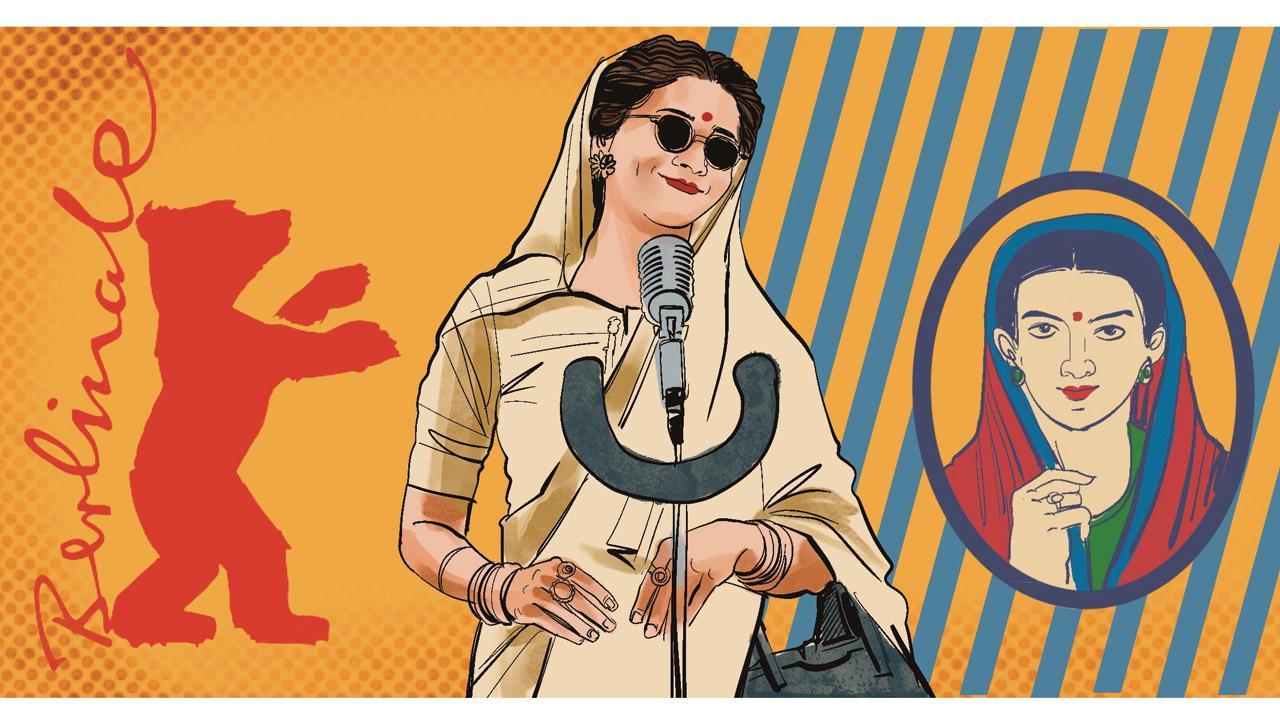There are a jaw-dropping 26 films and film talents selected to participate from South Asia across various sections, including 14 films and talents from India

Illustration/Uday Mohite
![]() Ooh, the 72nd Berlin Film Festival has opened, and I’m not there! The festival runs from February 10-20, and I’ve stayed back in Mumbai due to COVID concerns; I’m negative. I’m missing it intensely because it is the 24th year I’m working for the festival; now as India and South Asia Delegate, but much more because South Asia, including India, has such a powerful presence at the festival this year.
Ooh, the 72nd Berlin Film Festival has opened, and I’m not there! The festival runs from February 10-20, and I’ve stayed back in Mumbai due to COVID concerns; I’m negative. I’m missing it intensely because it is the 24th year I’m working for the festival; now as India and South Asia Delegate, but much more because South Asia, including India, has such a powerful presence at the festival this year.
There are a jaw-dropping 26 films and film talents selected to participate from South Asia across various sections, including 14 films and talents from India. These include eight films from South Asia, four jury members, three projects in the Berlinale Co-Production Market, and 11 Berlinale Talents. This is an amazing achievement, given that each is chosen from fierce competition worldwide.
The eight South Asian films selected include five from India. These are the highly anticipated Gangubai Kathiawadi by Sanjay Leela Bhansali, starring Alia Bhatt, with a guest appearance by Ajay Devgn. It is a biopic based on the book Mafia Queens of Mumbai by S Hussain Zaidi and our very own Jane Borges of mid-day. This kickass, feminist film celebrates the life of a sex worker, who rose to become a powerful matriarch of Kamathipura, Mumbai’s red light district. It will have its world premiere in the Berlinale Special Gala on February 16, at the spectacular Friedrichstadt Palast, where her Gully Boy had opened earlier. This is Bhatt’s third film in the Berlinale, after Highway in 2014 and Gully Boy in 2019, a remarkable achievement for an Indian actress, and who is estimated to be barely about 28. The film opens in cinemas on February 25.
Rebana Liz John’s Ladies Only is a wonderful, stylish, also feminist, b/w documentary (79 mins) that asks women in the ladies’ compartment of Mumbai’s local trains what makes them angry (men, men and men!). It is screening in the Perspektive Deutsches Kino section for German documentaries (the director is based in Cologne/Mumbai).
There are four filmmakers from South Asia/of South Asian origin on the Berlinale’s prestigious juries, and probably unprecedented. M Night Shyamalan is President of the International Jury. The India-born, US filmmaker has directed 14 features including his debut The Sixth Sense, that earned six Academy Award nominations. Payal Kapadia is on the International Short Film Jury in Berlinale Shorts; her A Night of Knowing Nothing won the Best Documentary at the Cannes Film Festival 2021. Vimukthi Jayasundara is on the International Jury for Best First Film (GWFF Best First Feature Award); the Sri Lankan director’s Forsaken Land and Chatrak were at Cannes; his Between Two Worlds was at Venice. Shahrbanoo Sadat is also on the International Jury for Best First Film: the feisty woman director, from Afghanistan, who was recently forced to flee into exile, earlier had two features, Wolf and Sheep and Parwareshgah (The Orphanage) in Cannes.
The filmmakers in the Berlinale’s other sections are Deepak Rauniyar’s Four Nights (US/Mexico/Nepal) in the Berlinale Shorts, a deeply moving short on a Nepali couple coping with job challenges and marital insecurities in the US, starring Dayahang Rai and Asha Magrati. From Nepal there’s also Surya Shahi’s Wheels on the Bus in Generation Kplus Short Competition (for children and young adults) that comments on caste discrimination. There are four South Asian films in the Forum Expanded section, that explores the intersection of cinema and the other arts. There’s New York-based Bangladeshi filmmaker Naeem Mohaiemen’s Jole Dobe Na (Those Who Do Not Drown, Bangla, India-USA-Japan-Sweden), a magnificent 64 min fiction on the afterlife of caregivers, that was selected in the Berlinale in 2021, but is screening this year instead because of COVID constraints. Teresa A Braggs’ documentary Sab chang-a si (All Was Good, India) is on the student protests against the Citizenship Amendment Act (CAA) in India. Pallavi Paul’s spectacularly titled installation The Wind in Your Body Is Just Visiting, Your Breath Will Soon Be Thunder (India, Germany), explores breath as a political practice, and is presented by SAVVY Contemporary. Her installation includes pyre burners, grave keepers and patients, and consists of moving image fragments, screens and her film The Blind Rabbit (43mins). Sharlene Bamboat’s If From Every Tongue It Drips (Canada, UK, Sri Lanka) explores the lives and culture of a couple of women living in Batticaloa, Sri Lanka: Ponni Arasu, who writes Rekhti, 19th-century Urdu, queer poetry, and Sarala, who is the camera operator.
All in all, a rich year for South Asia at the Berlinale.
Meenakshi Shedde is India and South Asia Delegate to the Berlin International Film Festival, National Award-winning critic, curator to festivals worldwide and journalist.
Reach her at meenakshi.shedde@mid-day.com
 Subscribe today by clicking the link and stay updated with the latest news!" Click here!
Subscribe today by clicking the link and stay updated with the latest news!" Click here!








